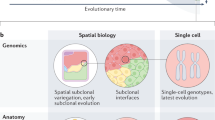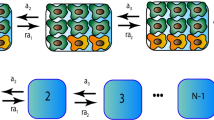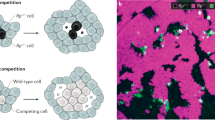Abstract
THE cancer investigator is primarily concerned with the nature and origin of uncontrolled growth in malignant tumours which depends on an aberration of normal cell division. The processes which underlie normal cell division and differentiation, however, are still far from being well understood. Cytology, so long as it remained a descriptive science, made little progress in this direction. But the change which occurred some fifteen years ago, when its methods became analytical and experimental, has by now made possible the interpretation of some growth processes in physico-chemical terms1—an advance which has in its turn stimulated a greater co-ordination among the different methods of approach to the cancer problem. Especially this advance has confirmed the remarkable uniformity of nuclear behaviour throughout living organisms. Experimental work on widely different organisms can therefore now be used to contribute to our understanding not only of normal but also of abnormal growth.
This is a preview of subscription content, access via your institution
Access options
Subscribe to this journal
Receive 51 print issues and online access
$199.00 per year
only $3.90 per issue
Buy this article
- Purchase on Springer Link
- Instant access to full article PDF
Prices may be subject to local taxes which are calculated during checkout
Similar content being viewed by others
References
Darlington, C. D., Discovery (March 1945).
Pianese, G., "Beitrag zur Histologie und Aetiologie de Karzinoms" (Jena: Fischer, 1896).
Levine, M., Amer. J. Cancer, 15, 124, 788, 1410 (1931).
Ludford, R. J., "Cytology and Cell Physiology", chap. 8 (Oxford, 1942).
Caspersson, T., and Santesson, L. Acta Radiologica, Suppl. XLVI (Stockholm, 1942).
Darlington, C. D., Nature, 149, 66 (1942).
Claude, A., Biol. Symp., 10, 111 (1943).
Koller, P. C., Nature, 161, 244 (1943).
La Cour, L. F., Proc. Roy. Soc. Edin., B, 62, 73 (1944).
Darlington, C. D., and Thomas, P. T., Proc. Roy. Soc., B, 130, 127 (1941).
Bausch, R., Naturwiss., 29, 503 (1941).
Thaysen, A. C., and Morris, M., Nature, 152, 526 (1943).
Badian, M., Bull. Int. Acad. Pol., B, 1, 1–5 (1937).
Boveri, T., "The Origin of Malignant Tumours" (Jena, 1914).
Heilbrunn, L. V., "The Colloid Chemistry of Protoplasm" (Berlin, 1928).
Seifriz, W., "A Symposium on the Structure of Protoplasm" (Iowa, 1942).
Evans, E. A., "Annual Review of Biochemistry", 12, 187 (1944).
Hochwald, cited in (5), p. 29.
Reiss, M., Med. Klin., 2, 1426 (1931).
Guyer, M. F., and Claus, P. E., Anat. Rec., 73, 17 (1939).
Beadle, G. W., Cornell Univ. Exp. Sta. (Ithaca) Mem., 135 (1931).
Darlington, C. D., Nature, 154, 114 (1944).
Potter, V. R., "Recent Advances in Enzymology", 4, 201 (New York, 1944).
Author information
Authors and Affiliations
Rights and permissions
About this article
Cite this article
THOMAS, P. Experimental Imitation of Tumour Conditions. Nature 156, 738–740 (1945). https://doi.org/10.1038/156738a0
Issue Date:
DOI: https://doi.org/10.1038/156738a0
This article is cited by
-
Chemically Induced Neoplasms in Fungi
Nature (1956)
-
Are Torulæ Haploid?
Nature (1953)
-
Problems in microbial genetics
Heredity (1948)
-
Some New Aspects of Mitotic Poisoning
Nature (1947)
Comments
By submitting a comment you agree to abide by our Terms and Community Guidelines. If you find something abusive or that does not comply with our terms or guidelines please flag it as inappropriate.



